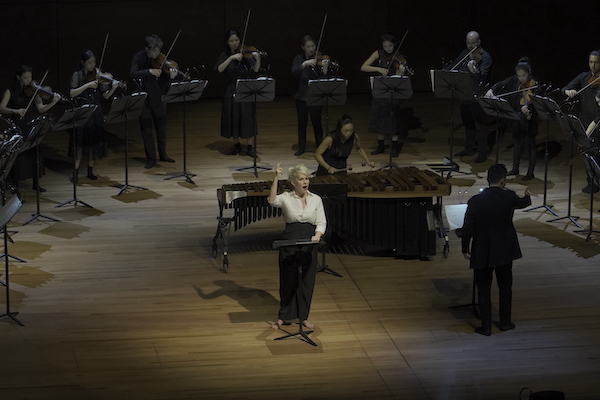Sejong Soloists offers polished playing, intriguing work in progress

Sejong Soloists, the polished chamber-size string orchestra, brought a quietly radical program into Alice Tully Hall Tuesday night. Piece by piece, there was nothing startling or unusual in the music—even with one world premiere.
Instead, it was the combination and juxtaposition that stood out. A lovely first half of the kind of music one can find on classical radio’s familiar style, was followed by a semi-staged monodrama from one of the most exploratory composers in America, based on work of one of the leading writers of speculative fiction.
One unexpected result was how well everything fit together; Michael Haydn, Mendelssohn, and Anton Webern (from his early romantic period), and the world premiere of Tod Machover’s Overstory Overture. Part of that success of the mix was simply how well Sejong played and how good the ensemble sounded; the other was, surprisingly, some basic musical similarity across all the works.
The first half was in no way predictable nor dull. The Haydn was Michael, after all, not his older brother Joseph, and the Adagio from his Notturno in F Major, which opened the concert, was a brief appetizer. Slow, nighttime music meant to deliver soothing sounds, its relaxed glow came through this singing performance.
Following this was Mendelssohn’s Violin Concerto—no, not the famous Op. 64 in E Minor, one but the one in D Minor, composed when he was 13. This is a semi-obscure work that has been floating around the main Mendelssohn repertoire since the middle of the 20th century. For soloist and string orchestra, it’s skillful but without the emotional depth of Op. 64. Still, it shares the humor of that later work but goes even further—the rondo- form Allegro finale has a back-and-forth jokiness closer to Spike Jones than anything in the classical repertoire.
Violinist Stephen Kim stepped out from behind the first stand to play the solo part and was terrific. In a piece that hits all the right spots but without any memorable melodic distinction, his intonation and articulation were excellent. Kim played with a light vibrato and emphasized the range of colors and timbres he could get out of the instrument, including ending one phrase with a partial harmonic on a sustained note. Kim took this congenial, unobtrusive music and made it fascinating in the moment with his own considerable skill and musicality.
Finishing the opening half was Webern’s Langsamer Satz, given a gorgeous performance through a mellow, full ensemble sound that brought out the powerful feeling that Webern was thinking deeply about Mahler when he wrote this piece.
Sejong commissioned the Overstory Overture, heard in the second half. The work is based on Richard Powers’ 2018 novel The Overstory about the experiences between several characters and trees. Machover’s work sets Simon Robson’s libretto focusing on just one character, Patricia Westerford, who sings of her experiences and personal transformations. Mezzo-soprano Joyce DiDonato, who worked with Machover on developing the piece, sang the part, which was performed with movement and blocking directed by Karol Armitage.
This is an overture in the formal sense, Machover is working on a large-scale opera of the full novel, but Overstory Overture felt like a complete, self-contained work. The composer is well known for his explorations of how technology can alter music, and vice versa. While frequently lauded as an innovator, Machover’s harmony and form can often fall into the merely prosaic and mainstream. The salient technology in Overstory is the additional of an electronic keyboard, with samples, to the ensemble, along with one percussionist. This second half also brought out Earl Lee to conduct with attention and sensitivity.
Overstory Overture is very much in line with older tonal modernism—it shares some specific colors and vocal phases with some vocal works of Samuel Barber—giving it the unexpected feeling of an extension of the traditions heard on the first half. The work is finely written and meets its goals more successfully than one has heard from Machover in many years.
DiDonato’s rich voice and expressive commitment were integral to this; the beauty of her vocal sound was captivating and the singer’s conviction was often convincing. Machover’s gliding, attractive harmonies mixed well with her sound—Armitage’s direction had the musicians do things like sway side to side, as trees in the wind, and was simple and effective—and overcame, or at least hid, the frequently awkward sections of the libretto. (One early stretch has Westerford essentially lecturing the audience on the details of her resume, but was smooth.)
This all well-shaped and built to a strong finale, the music rising and falling in waves. The actual drama might be a work in-progress, and somewhat buried in this opening performance, but the music showed Machover, DiDonato, and performers hitting a sweet spot in this work-in-progress.







Posted Mar 10, 2023 at 5:55 pm by Dr. Eileen J. Ain
The images and experiences of new sounds assimilating with nature inspires me to continue to explore archetypical sound and its meanings.
Posted Mar 14, 2023 at 10:49 pm by Eileen J. Ain
The images and experiences of new sounds assimilating with nature inspires me to continue to explore archetypical sound and its meanings.